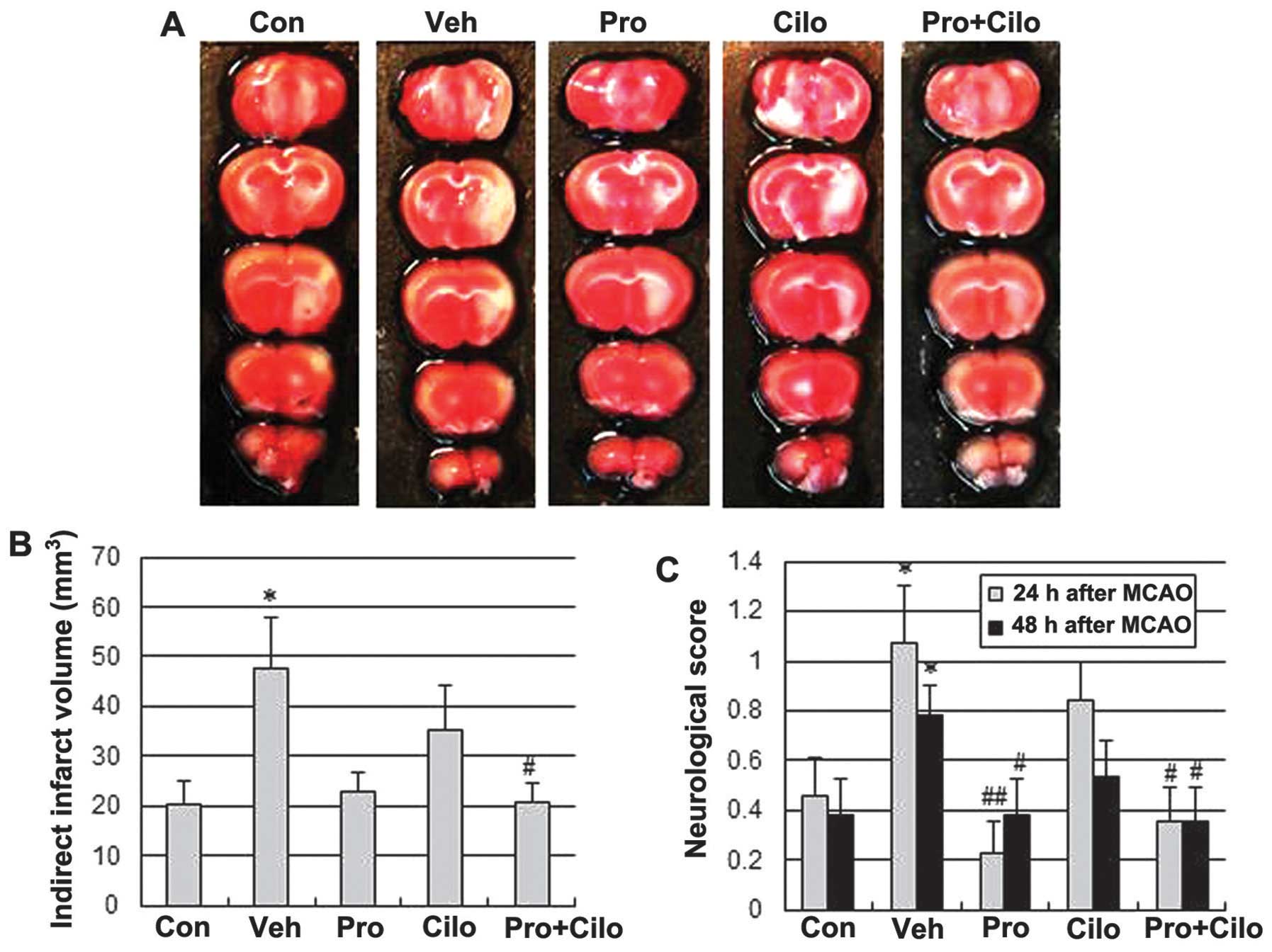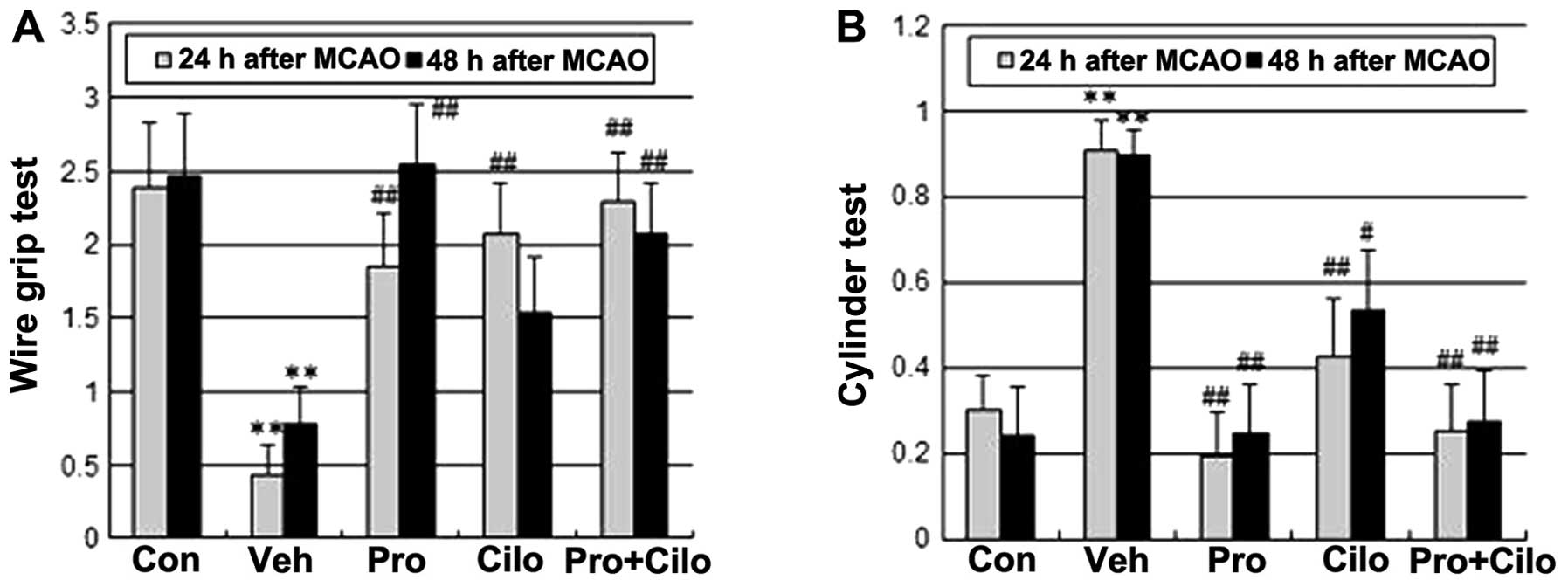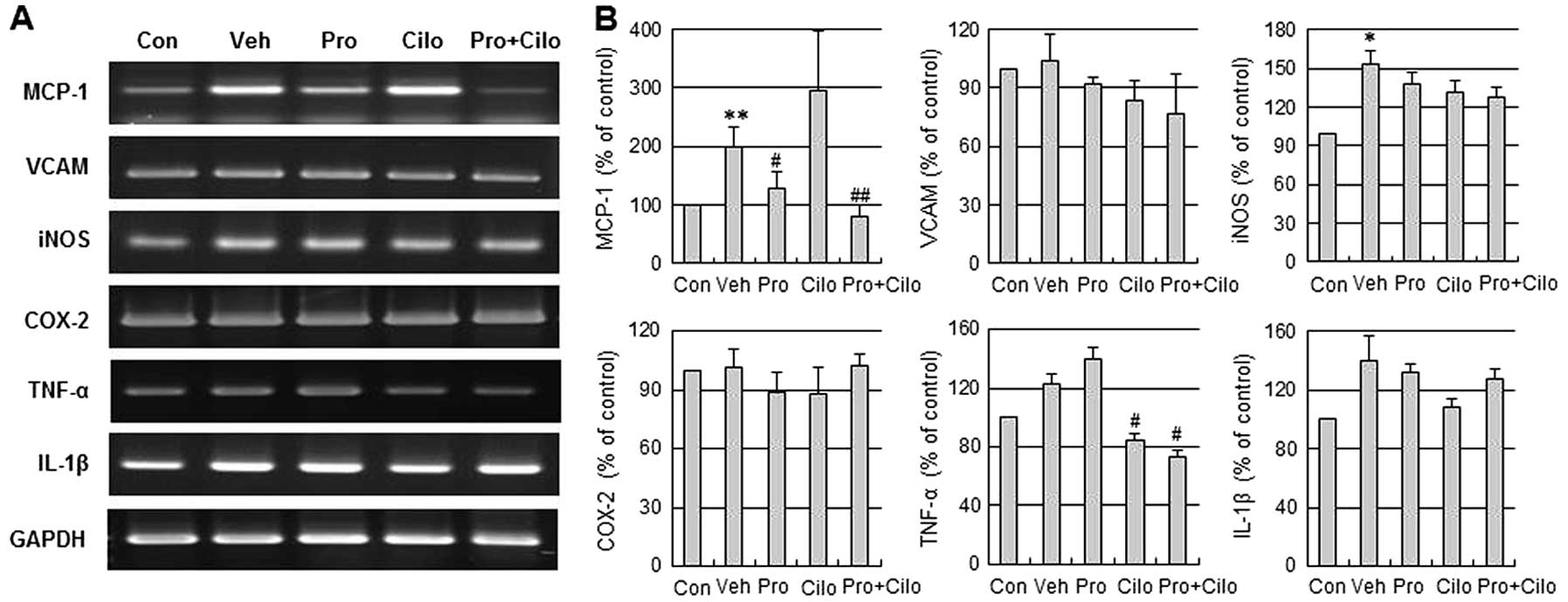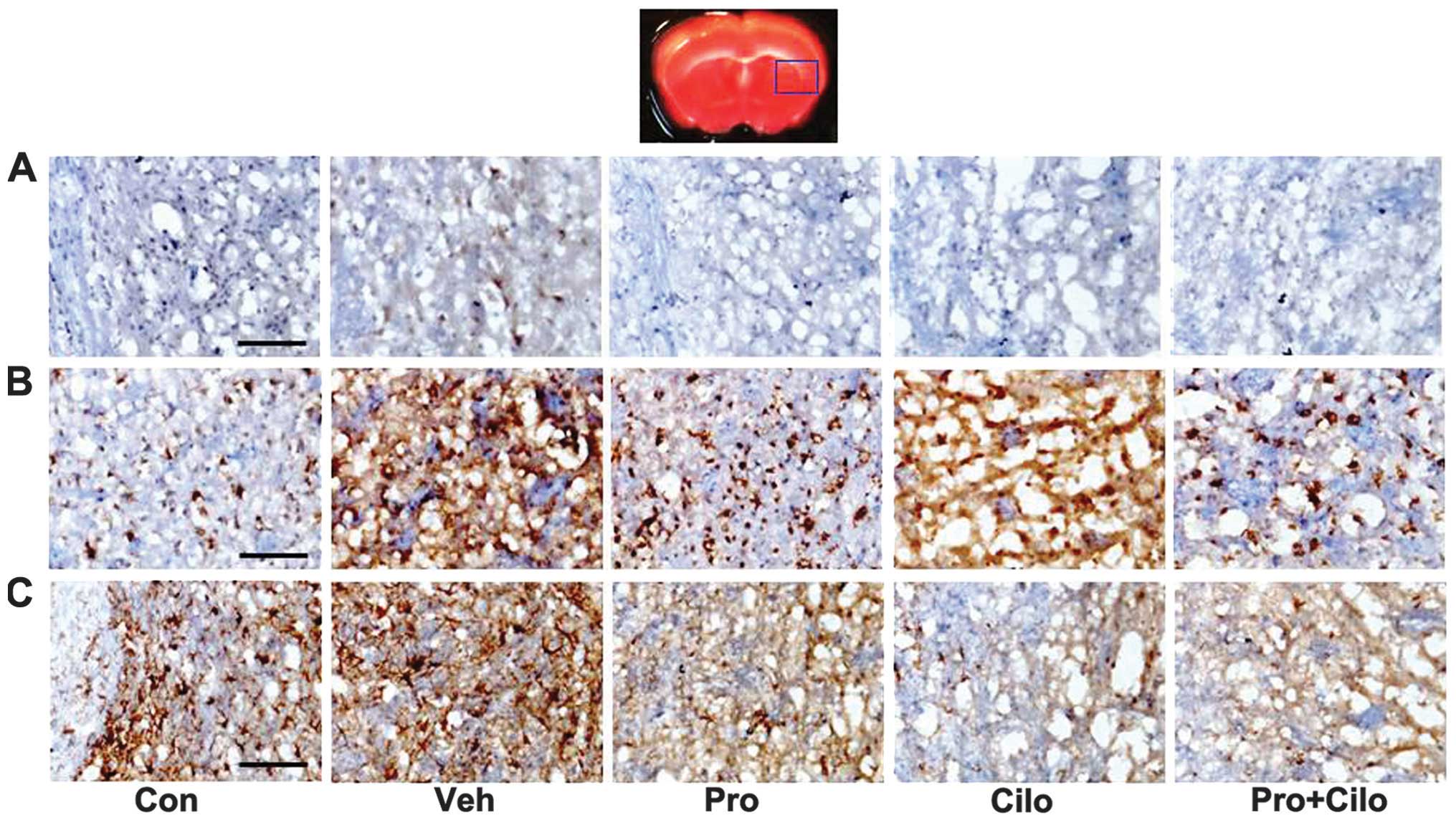|
1
|
Amarenco P: Hypercholesterolemia,
lipid-lowering agents, and the risk for brain infarction.
Neurology. 57:S35–S44. 2001. View Article : Google Scholar : PubMed/NCBI
|
|
2
|
Engstrom G, Lind P, Hedblad B, Stavenow L,
Janzon L and Lindgarde F: Effects of cholesterol and
inflammation-sensitive plasma proteins on incidence of myocardial
infarction and stroke in men. Circulation. 105:2632–2637. 2002.
View Article : Google Scholar : PubMed/NCBI
|
|
3
|
Macrez R, Ali C, Toutirais O, et al:
Stroke and the immune system: from pathophysiology to new
therapeutic strategies. Lancet Neurol. 10:471–480. 2011. View Article : Google Scholar : PubMed/NCBI
|
|
4
|
Dirnagl U, Iadecola C and Moskowitz MA:
Pathobiology of ischaemic stroke: an integrated view. Trends
Neurosci. 22:391–397. 1999. View Article : Google Scholar : PubMed/NCBI
|
|
5
|
Yamashita S and Matsuzawa Y: Where are we
with probucol: a new life for an old drug? Atherosclerosis.
207:16–23. 2009. View Article : Google Scholar : PubMed/NCBI
|
|
6
|
Weintraub WS: The vascular effects of
cilostazol. Can J Cardiol. 22(Suppl B): 56B–60B. 2006. View Article : Google Scholar : PubMed/NCBI
|
|
7
|
Lee JH, Park SY, Shin YW, et al:
Neuroprotection by cilostazol, a phosphodiesterase type 3
inhibitor, against apoptotic white matter changes in rat after
chronic cerebral hypoperfusion. Brain Res. 1082:182–191. 2006.
View Article : Google Scholar
|
|
8
|
Park SY, Lee JH, Shin HK, et al:
Synergistic efficacy of concurrent treatment with cilostazol and
probucol on the suppression of reactive oxygen species and
inflammatory markers in cultured human coronary artery endothelial
cells. Korean J Physiol Pharmacol. 12:165–170. 2008. View Article : Google Scholar
|
|
9
|
Park SY, Lee JH, Kim CD, Rhim BY, Hong KW
and Lee WS: Beneficial synergistic effects of concurrent treatment
with cilostazol and probucol against focal cerebral ischemic injury
in rats. Brain Res. 1157:112–120. 2007. View Article : Google Scholar : PubMed/NCBI
|
|
10
|
Yoshikawa T, Mitani K, Kotosai K, Nozako
M, Miyakoda G and Yabuuchi Y: Antiatherogenic effects of cilostazol
and probucol alone, and in combination in low density lipoprotein
receptor-deficient mice fed with a high fat diet. Horm Metab Res.
40:473–478. 2008. View Article : Google Scholar : PubMed/NCBI
|
|
11
|
Kim JH, Park SH, Bae SS, et al:
Combinatorial effect of probucol and cilostazol in focal ischemic
mice with hypercholesterolemia. J Pharmacol Exp Ther. 338:451–457.
2011. View Article : Google Scholar : PubMed/NCBI
|
|
12
|
Zisman DA, Kunkel SL, Strieter RM, et al:
MCP-1 protects mice in lethal endotoxemia. J Clin Invest.
99:2832–2836. 1997. View Article : Google Scholar : PubMed/NCBI
|
|
13
|
Rankine EL, Hughes PM, Botham MS, Perry VH
and Felton LM: Brain cytokine synthesis induced by an
intraparenchymal injection of LPS is reduced in MCP-1-deficient
mice prior to leucocyte recruitment. Eur J Neurosci. 24:77–86.
2006. View Article : Google Scholar : PubMed/NCBI
|
|
14
|
Huang Z, Huang PL, Panahian N, Dalkara T,
Fishman MC and Moskowitz MA: Effects of cerebral ischemia in mice
deficient in neuronal nitric oxide synthase. Science.
265:1883–1885. 1994. View Article : Google Scholar : PubMed/NCBI
|
|
15
|
Lin TN, He YY, Wu G, Khan M and Hsu CY:
Effect of brain edema on infarct volume in a focal cerebral
ischemia model in rats. Stroke. 24:117–121. 1993.PubMed/NCBI
|
|
16
|
Li X, Blizzard KK, Zeng Z, DeVries AC,
Hurn PD and McCullough LD: Chronic behavioral testing after focal
ischemia in the mouse: functional recovery and the effects of
gender. Exp Neurol. 187:94–104. 2004. View Article : Google Scholar : PubMed/NCBI
|
|
17
|
Chen T, Liu W, Chao X, et al: Salvianolic
acid B attenuates brain damage and inflammation after traumatic
brain injury in mice. Brain Res Bull. 84:163–168. 2011. View Article : Google Scholar : PubMed/NCBI
|
|
18
|
Hua Y, Schallert T, Keep RF, Wu J, Hoff JT
and Xi G: Behavioral tests after intracerebral hemorrhage in the
rat. Stroke. 33:2478–2484. 2002. View Article : Google Scholar : PubMed/NCBI
|
|
19
|
Strandgaard S: Hypertension and stroke. J
Hypertens Suppl. 14:S23–S27. 1996. View Article : Google Scholar
|
|
20
|
Kernan WN and Inzucchi SE: Type 2 diabetes
mellitus and insulin resistance: stroke prevention and management.
Curr Treat Options Neurol. 6:443–450. 2004. View Article : Google Scholar : PubMed/NCBI
|
|
21
|
Fisher M, Feuerstein G, Howells DW, et al:
Update of the stroke therapy academic industry roundtable
preclinical recommendations. Stroke. 40:2244–2250. 2009. View Article : Google Scholar : PubMed/NCBI
|
|
22
|
Nakashima Y, Plump AS, Raines EW, Breslow
JL and Ross R: ApoE-deficient mice develop lesions of all phases of
atherosclerosis throughout the arterial tree. Arterioscler Thromb.
14:133–140. 1994. View Article : Google Scholar : PubMed/NCBI
|
|
23
|
Sacco RL, Diener HC, Yusuf S, et al:
Aspirin and extended-release dipyridamole versus clopidogrel for
recurrent stroke. N Engl J Med. 359:1238–1251. 2008. View Article : Google Scholar : PubMed/NCBI
|
|
24
|
Rother J, Alberts MJ, Touze E, et al: Risk
factor profile and management of cerebrovascular patients in the
REACH Registry. Cerebrovasc Dis. 25:366–374. 2008. View Article : Google Scholar : PubMed/NCBI
|
|
25
|
Rahman SM, Van Dam AM, Schultzberg M and
Crisby M: High cholesterol diet results in increased expression of
interleukin-6 and caspase-1 in the brain of apolipoprotein E
knockout and wild type mice. J Neuroimmunol. 169:59–67. 2005.
View Article : Google Scholar : PubMed/NCBI
|
|
26
|
Thirumangalakudi L, Prakasam A, Zhang R,
et al: High cholesterol-induced neuroinflammation and amyloid
precursor protein processing correlate with loss of working memory
in mice. J Neurochem. 106:475–485. 2008. View Article : Google Scholar : PubMed/NCBI
|
|
27
|
Xue QS, Sparks DL and Streit WJ:
Microglial activation in the hippocampus of hypercholesterolemic
rabbits occurs independent of increased amyloid production. J
Neuroinflammation. 4:202007. View Article : Google Scholar : PubMed/NCBI
|
|
28
|
Morello F, Saglio E, Noghero A, et al:
LXR-activating oxysterols induce the expression of inflammatory
markers in endothelial cells through LXR-independent mechanisms.
Atherosclerosis. 207:38–44. 2009. View Article : Google Scholar : PubMed/NCBI
|
|
29
|
Sottero B, Gamba P, Gargiulo S,
Leonarduzzi G and Poli G: Cholesterol oxidation products and
disease: an emerging topic of interest in medicinal chemistry. Curr
Med Chem. 16:685–705. 2009. View Article : Google Scholar : PubMed/NCBI
|
|
30
|
Jeitner TM, Voloshyna I and Reiss AB:
Oxysterol derivatives of cholesterol in neurodegenerative
disorders. Curr Med Chem. 18:1515–1525. 2011. View Article : Google Scholar : PubMed/NCBI
|
|
31
|
Kalayci R, Kaya M, Uzun H, et al:
Influence of hypercholesterolemia and hypertension on the integrity
of the blood-brain barrier in rats. Int J Neurosci. 119:1881–1904.
2009. View Article : Google Scholar
|
|
32
|
Campos P, Saguy A, Ernsberger P, Oliver E
and Gaesser G: The epidemiology of overweight and obesity: public
health crisis or moral panic? Int J Epidemiol. 35:55–60. 2006.
View Article : Google Scholar : PubMed/NCBI
|
|
33
|
George MG, Tong X, Kuklina EV and Labarthe
DR: Trends in stroke hospitalizations and associated risk factors
among children and young adults, 1995–2008. Ann Neurol. 70:713–721.
2011.PubMed/NCBI
|
|
34
|
Deutsch C, Portik-Dobos V, Smith AD, Ergul
A and Dorrance AM: Diet-induced obesity causes cerebral vessel
remodeling and increases the damage caused by ischemic stroke.
Microvasc Res. 78:100–106. 2009. View Article : Google Scholar : PubMed/NCBI
|
|
35
|
Osmond JM, Mintz JD, Dalton B and Stepp
DW: Obesity increases blood pressure, cerebral vascular remodeling,
and severity of stroke in the Zucker rat. Hypertension. 53:381–386.
2009. View Article : Google Scholar : PubMed/NCBI
|
|
36
|
Huang D, Han Y, Rani MR, et al: Chemokines
and chemokine receptors in inflammation of the nervous system:
manifold roles and exquisite regulation. Immunol Rev. 177:52–67.
2000. View Article : Google Scholar : PubMed/NCBI
|
|
37
|
McManus CM, Liu JS, Hahn MT, et al:
Differential induction of chemokines in human microglia by type I
and II interferons. Glia. 29:273–280. 2000. View Article : Google Scholar : PubMed/NCBI
|
|
38
|
Chen Y, Hallenbeck JM, Ruetzler C, et al:
Overexpression of monocyte chemoattractant protein 1 in the brain
exacerbates ischemic brain injury and is associated with
recruitment of inflammatory cells. J Cereb Blood Flow Metab.
23:748–755. 2003. View Article : Google Scholar : PubMed/NCBI
|
|
39
|
Hughes PM, Allegrini PR, Rudin M, Perry
VH, Mir AK and Wiessner C: Monocyte chemoattractant protein-1
deficiency is protective in a murine stroke model. J Cereb Blood
Flow Metab. 22:308–317. 2002. View Article : Google Scholar : PubMed/NCBI
|
|
40
|
Kuzuya M and Kuzuya F: Probucol as an
antioxidant and antiatherogenic drug. Free Radic Biol Med.
14:67–77. 1993. View Article : Google Scholar : PubMed/NCBI
|
|
41
|
Wu BJ, Di Girolamo N, Beck K, et al:
Probucol
[4,4′-[(1-methylethylidene)bis(thio)]bis-[2,6-bis(1,1-dimethylethyl)phenol]]
inhibits compensatory remodeling and promotes lumen loss associated
with atherosclerosis in apolipoprotein E-deficient mice. J
Pharmacol Exp Ther. 321:477–484. 2007.
|
|
42
|
Chang MY, Sasahara M, Chait A, Raines EW
and Ross R: Inhibition of hypercholesterolemia-induced
atherosclerosis in the nonhuman primate by probucol. II. Cellular
composition and proliferation. Arterioscler Thromb Vasc Biol.
15:1631–1640. 1995. View Article : Google Scholar : PubMed/NCBI
|
|
43
|
Ku G, Doherty NS, Schmidt LF, Jackson RL
and Dinerstein RJ: Ex vivo lipopolysaccharide-induced interleukin-1
secretion from murine peritoneal macrophages inhibited by probucol,
a hypocholesterolemic agent with antioxidant properties. FASEB J.
4:1645–1653. 1990.
|
|
44
|
Li T, Chen W, An F, et al: Probucol
attenuates inflammation and increases stability of vulnerable
atherosclerotic plaques in rabbits. Tohoku J Exp Med. 225:23–34.
2011. View Article : Google Scholar : PubMed/NCBI
|
|
45
|
Lee JH, Oh GT, Park SY, et al: Cilostazol
reduces atherosclerosis by inhibition of superoxide and tumor
necrosis factor-alpha formation in low-density lipoprotein
receptor-null mice fed high cholesterol. J Pharmacol Exp Ther.
313:502–509. 2005.PubMed/NCBI
|


















